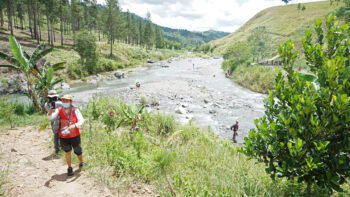CAGAYAN DE ORO CITY (MindaNews/25 March) — Ideally, beginning Saturday, March 29, when the Barangay Assembly convenes nationwide, People Power should awaken in every community. It is the surest way to energize the development of the immediate community, which is the locus of our republic’s primary government.
Since 1992, when barangays first became full-fledged governments as well as public corporations and an economy in their own right, the law has hardly been observed with respect to the role of the people in their own community.
Local officials and the higher-ups have distorted the letter and spirit of the law that ennobled the people’s role, function, and essentiality in the barangay’s operations, especially in the Barangay Assembly. Result: there is power failure at the primary level of our republic.
Barangaynons do not have an effective voice in their own community, not even its knowledgeable citizens–they do not influence the direction of politics or the behavior of democracy in their immediate surroundings. And the irony is, they make the loudest noises at upper levels and on national media. But at grassroots level, which is their neighborhood, they leave things to the devices of the servants of the people, sidelining the people themselves.
Mandate
The essence of democracy is People Power. It thrives on the people’s participation. It is sustained by the popular will. The popular will is manifested not only by votes during elections but by consent of the governed. Their consent to official acts or decisions embodies their sovereignty and authority.
Unfortunately, what the Constitution says about the people’s role is not made clear. “The Philippines is a democratic and republican state,” it states. “Sovereignty resides in the people and all government authority emanates from them” (Article II, Section 1).
The term “democratic” means rule of the people, while “republican” means it is the people who choose who shall rule and decide what decisions are acceptable.
The second part (on sovereignty and authority) simply means that People Power or the popular will is paramount. But the tricky part is how or whether people do manifest or define People Power and assert it.
Manifesting the substance of People Power or expressing the popular will requires discussion, sharing, or exchange of views and sentiments. The result is consensus, then harmony, which produces solidarity. Thus it is important for the community to engage in free or open exchange.
And this is where the Barangay Assembly comes in—as the venue and process for issues to be taken up and exchanged, then for resolutions that manifest the popular will to be passed.
In other words, in order to summon the genie of people power, it is imperative for everyone to convene as a community and engage in what advanced democracies term as “deliberative conversations.” Only if they do can they define or determine the popular will, which is a collective decision or agreement usually made through a motion and expressed in a resolution.
It is the formal, open exchange of views and positions that enable the people as a community to reach consensus. Popular will emerges through this participatory process. Unless this process takes place, democracy is frustrated and people power cannot energize the engine of government and the economy.
What happens then is the take-over of the community by an oligarchy—in which political power is held by only a handful, trapos usually. So democracy suffers a setback and People Power is dimmed.
The Barangay Assembly as both process and venue of governance exemplifies direct democracy—which is unique to our basic communities. It is this direct democracy that distinguishes grassroots governance from the representative democracy of the upper governments (municipal to national).
And because the Barangay Assembly comprises the entire local polity, it is literally a Constituent Assembly with all that this term implies. It is the home of sovereignty in our community, the seat of government authority.
As such, it is the authentic voice of the people. No other body or unit can claim to speak for the entire community. It is the literal embodiment of “a government of the people” and “a government by the people”—all of the people collectively governing!
Congressmen and Senators (who can transform themselves into a “constituent assembly” on occasion) are mere proxies of the people. It is the people who comprise the Barangay Assembly who are the real, actual constituents.
Let us not belittle our Constituent Assembly on Saturday, March 29. To be there is to raise the voice of People Power and let it be heard and felt. It is to assert the will of the sovereign citizens from whom every vote for every official at every level comes. It is to exercise one’s authority over all officials and bureaucrats.
Any Filipino who ignores the Barangay Assembly, or who willfully absents himself from its session, belittles his own sovereignty and authority and denigrates his role as a citizen of our republic!
Manny among others is former UNESCO regional director for Asia-Pacific, secretary-general of Southeast Asian Publishers Association, director at development academy of Philippines, member of the Permanent Mission to the United Nations, vice chair of Local Government Academy, member of the Cory Government’s Peace Panel, and PPI-UNICEF awardee for outstanding columnist. valdehuesa@gmail.com







